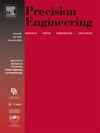Efficient identification of cutter axis offset in five-axis ball-end interrupted milling using twin data method free from cutting force model
IF 3.5
2区 工程技术
Q2 ENGINEERING, MANUFACTURING
Precision Engineering-Journal of the International Societies for Precision Engineering and Nanotechnology
Pub Date : 2024-09-11
DOI:10.1016/j.precisioneng.2024.08.017
引用次数: 0
Abstract
Although many methods for the identification of cutter axis offset have been proposed, almost all approaches are based on the computation models of cutting force. The mechanical behavior of the cutting tool cannot always be completely described by the existing force models. Once the cutting force is calculated inaccurately, the identification of cutter axis offset certainly is affected. In order to get rid of dependence on cutting force model, this paper presents a twin data driven model for the efficient identification of cutter axis offset in five-axis ball-end interrupted milling. The cutter coupled motion is divided into the two decouple standard movement units at first. The measured feature parameter of the axis offset is then extracted from cutting force signal by the geometric modeling technology. Subsequently, the theoretical and measured critical cutting positions are defined as a pair of twins. The axis offset parameters are identified by minimizing the distance of the twin data using the intelligent optimization algorithm. Lastly, the effectiveness of the proposed method is verified by the numerical examples and cutting experiments performed in five-axis ball-end milling.
使用不含切削力模型的孪生数据法有效识别五轴球头断续铣削中的刀轴偏移量
尽管已经提出了许多识别切削轴偏移的方法,但几乎所有方法都是基于切削力的计算模型。现有的力模型并不能完全描述切削刀具的机械行为。一旦切削力计算不准确,刀轴偏移的识别肯定会受到影响。为了摆脱对切削力模型的依赖,本文提出了一种孪生数据驱动模型,用于有效识别五轴球头断续铣削中的刀轴偏移。首先将铣刀耦合运动划分为两个解耦标准运动单元。然后通过几何建模技术从切削力信号中提取轴偏移的测量特征参数。随后,理论临界切削位置和测量临界切削位置被定义为一对孪生兄弟。利用智能优化算法,通过最小化孪生数据的距离来确定轴偏移参数。最后,通过在五轴球头铣削中进行的数值示例和切削实验验证了所提方法的有效性。
本文章由计算机程序翻译,如有差异,请以英文原文为准。
求助全文
约1分钟内获得全文
求助全文
来源期刊
CiteScore
7.40
自引率
5.60%
发文量
177
审稿时长
46 days
期刊介绍:
Precision Engineering - Journal of the International Societies for Precision Engineering and Nanotechnology is devoted to the multidisciplinary study and practice of high accuracy engineering, metrology, and manufacturing. The journal takes an integrated approach to all subjects related to research, design, manufacture, performance validation, and application of high precision machines, instruments, and components, including fundamental and applied research and development in manufacturing processes, fabrication technology, and advanced measurement science. The scope includes precision-engineered systems and supporting metrology over the full range of length scales, from atom-based nanotechnology and advanced lithographic technology to large-scale systems, including optical and radio telescopes and macrometrology.

 求助内容:
求助内容: 应助结果提醒方式:
应助结果提醒方式:


